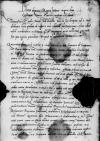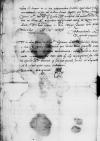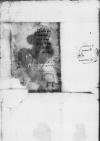[Reverendo in] Christo Patri, ⌊[domino Ioanni] Dantisco⌋ [episcopo Culm]ensi, apud ⌊[sacram caesaream maiesta]tem⌋ regio [ac nostro nuntio] et oratori, [sincere nobis] dilecto
Plures hoc tempore ad Sinceritatem Tuam dedimus litteras, quibus de negotiis nostris abunde perscripsimus. Nunc aliud nihil scribendum censuimus, quam quod magnopere scire vellemus, quomodo haec ipsa negotia procedant et quid ad extremum sperandum sit.
Quemadmodum autem videbit Sinceritas Tua procede[r]e res ⌊Scipionis de Summa⌋, ita etiam negotia nostra accommodabit, hoc tamen secretius tenebit, ut si Scipio de Summa in gratiam ⌊caesaris⌋ non redibit et ad officium suum in ⌊ducatu nostro Barensi⌋ restitutus non fuerit, nos etiam fratrem eius ⌊Nicolaum Maria⌋ castellanum habere nollemus. Sed ne hoc de mente et voluntate nostra procedere videretur, efficere deberet Sinceritas Tua, ut ⌊caesarea maiestas⌋ litteris suis declararet nobis et concilio collaterali se destituisse ⌊Scipionem⌋ de officio, cui praeerat, et ob id nolle, quod nos frat[rem eius] ⌊Nicolaum Maria⌋ in castellanatu nostro haberemus, sed ut ... nobis antea facultatem mandet tres a nobis sibi nom[inatos] ..., cum in longinquo simus, ne interea sacra illius maiestas ...deret sicque hoc negotium infectum relinqueretur. Sciat [Sinceritas Tua nos esse] nominaturas tres, ⌊Octavianum Guidanum⌋ patricium Lecii ...], gubernatorem nostrum ⌊Ferdinandum Brancatium⌋ Neapolitanum et ⌊Ioannem Stephanum Reynam⌋ patricium Mediolanensem possessionatum in ⌊ducatu nostro Barensi⌋. Quorum duo, Octavianus et Ferdinandus, sacrae ⌊maiestati caesareae⌋ noti sunt, nam in curia illius erant. Inter omnes tamen deligeremus Octavianum Guidanum, virum maturum, probum et in rebus bene gerendis factivum.
Et haec esset ultima voluntas nostra, si ut diximus, res ⌊Scipionis⌋ ad eum scopum deducta esset, tamen rebus et tempori se Sinceritas Tua accommodare studebit, quod illius indust[riae] committimus et, hoc ubi factum fuerit, statim per postas utrasque ⌊caesareae maiestatis⌋ tam nobis quam, concilio collaterali scriptas ad manus nostras tra[nsmit]tat, ne illius maiestati respondere negligeremus, antequam ex ⌊Germania⌋ d[ece]deret.
Et bene valeat Sinceritas Tua.
Datae ⌊Cracoviae⌋, die paenul[tima] Novembris M-o D-o XXX-o.
Et si idem ⌊Scipio⌋ per sacram ⌊maiestatem caesaream⌋ destitutus fuerit, faciat Sinceritas Tua, [u] caesarea maiestas nobis per litteras expresse man[da]ret, ne illum in eo officio servaremus, sicut nobis Sinceritas Tua ante[a] scripserat, ne tam ipse, quam alii consanguinei sui etia[m] in concilio collaterali dicerent, quod hoc nos operatae sumus et aliquando ob id aliqui nobis nocere studerent.
⌊Bona⌋ regina subscripsit.


